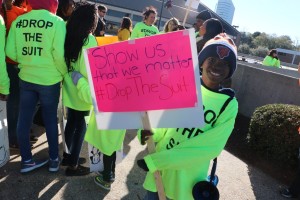Two events of national import on the school choice front in Florida deserve more celebration. Both of them – the 10,000-strong school choice rally with Martin Luther King III, and the signing of the bill expanding Florida’s education savings account program – suggest the choice debate continues to move to a less political place, or at least a more bipartisan one. Who doesn’t say hooray to that?

The Jan. 19 rally generated a flood of headlines in large part because of King. Many in the school choice realm know choice has roots on the left, but that’s not common knowledge among choice critics or reporters. So when the son of Dr. King joined thousands of low-income parents chanting “Drop The Suit!” (referring to the lawsuit the teachers union filed to kill the state’s tax credit scholarship program), fresh ink flowed by the barrel over stale narratives about right-wing plots.
The choice rally was also upbeat and nearly apolitical, unlike a teacher union rally the week prior. The choice crowd sang “We Are Family”; the union rally played “We’re Not Gonna Take It.” Nobody at the former talked about kicking politicians out of office. King expressed faith in the courts: “Ultimately, if the courts have to decide, the courts will be on the side of justice,” he told the crowd. “Because this is about justice. This is about righteousness. This is about truth. This is about freedom – the freedom to choose what’s best for your family, and your child most importantly.”
The bill signing two days later didn’t get as much publicity, but it was just as meaningful. Gov. Rick Scott okayed expansion of the Gardiner Scholarship after the bill sailed through the Legislature with overwhelming, bipartisan support. Formerly called the Personal Learning Scholarship Account, the Gardiner Scholarship for students with special needs is now the nation’s biggest education savings account program. It’s a sign of where things are headed as school choice becomes educational choice, and as the forces for customizing education rise to the fore.
It’s also a sign of political progress. For those familiar with Florida’s long-running “voucher wars,” seeing Democrats and Republicans alike go all in for the scholarship was incredible. The union savaged the PLSA before it became law in 2014, and even tried to kill the bill that created it. Less than two years later, every Democratic lawmaker is on board?! The support is even more stunning given how partisan school choice remains in virtually every state. What quietly happened in Florida with the Gardiner Scholarship is a sign of how things can and should be everywhere, and, slowly but surely, will be.
(Full disclosure: Step Up For Students, a nonprofit that helps administer the tax credit and Gardiner scholarship programs, hosts this blog and employs the author of this post.)
That’s not to suggest everything’s hunky dory. Florida teacher union president Joanne McCall issued a statement after the choice rally that referenced the lawsuit and asked of its detractors, “What are they so afraid of?” The union also launched a mini offensive with op-eds, recycling talking points about tax credit scholarships that, so far, have been ably rebutted by parents (see here and here).
The rally and bill signing also underscored how selective the union and its allies have been in their targeting. Tax credit scholarships violate constitutional mandates for education “uniformity,” but charter schools, which serve three times as many students, don’t? Tax credit scholarships cross church-state lines, but vouchers for special-needs students and Bright Futures scholarships for college students, which are also accepted at faith-based institutions, are good to go? Why, when Florida has five privately operated choice programs in PreK-12, is the union only suing the one for poor kids?
Those are fair questions, aren’t they? Here’s another: If expanding educational options for students with special needs is worthy of a collective cheer, is there good reason not to do the same for students disadvantaged by poverty?
I don’t see one, and I don’t think it’s a stretch to think more and more fair-minded people won’t either. At the least, the recent happenings in Florida will spur more of them to think about the disconnect.



[…] Matus, director for policy and public affairs at Step Up for Students, described the rally as “upbeat and nearly apolitical.” King told the Tallahassee crowd, “this is about […]
It was an honor for our family and I to be apart of this monumental movement, supporting school choice for our kids. Our kids matter, so show them that they matter and #Dropthesuit as my son Solomon pictured above sign says.
Hi LaTrisha, thanks so much for taking time out to comment, and even more for attending the rally. It was an honor for me to be there, too, and especially to see all the parents. I think the message got across loud and clear. 🙂